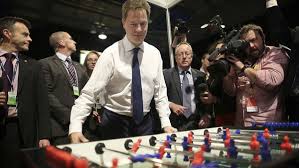By Paul Nicholson
July 25 – The first leading British politician to call for Russia to be stripped of the hosting rights to the 2018 World Cup, following the downing of the Malaysian airliner in the Ukraine, was made by deputy prime minister Nick Clegg (pictured) yesterday and, perhaps not surprisingly, it was in an interview with Rupert Murdoch’s Sunday Times newspaper.
There had been a similar call last week from German MP, Michael Fuchs, which prompted FIFA to issue a statement that it would not be stripping Russia of the 2018 tournament. The governing body reissued the same statement following Clegg’s comments.
Clegg said the Russian president’s behaviour had reached a “tipping point”, saying that “failure to pull the plug on the Word Cup” would “make the world look so weak and so insincere.”
Clegg also suggested that England, losers in the bid process for 2018 to Russia, would be able to pick up hosting rights. A position similarly taken in the US over the 2022 World Cup where US critics of the Qatar hosting have been quick to say they could put on the tournament.
British prime minister David Cameron was quick to distance himself from the comments of his deputy leader with a spokesman saying: “The prime minister does not believe we should immediately reach for boycotts, but it is also not surprising given Russian behaviour, that people are starting to raise the issue.”
The reality is that if Britain’s government is really serious about changing Russian behaviour then there are a series of economic sanctions and monetary freezes it could apply that would likely have a greater and more immediate impact on Russian thinking. That is looking increasingly unlikely to happen leaving the World Cup hosting in-play as the political football of convenience.
On Friday FIFA issued a statement in response to similar calls in Germany, saying that football cannot be seen as the solution to all the world’s political problems, no matter how powerful the game is in communicating to global audiences.
“FIFA deplores any form of violence and will continue to use its tournaments to promote dialogue, understanding and peace among peoples,” said the statement.
“History has shown so far that boycotting sport events or a policy of isolation or confrontation are not the most effective ways to solve problems. The hosting of the FIFA World Cup with the global attention it attracts can be a powerful catalyst for constructive dialogue between people and governments, helping to bring positive social developments. The FIFA World Cup unites teams and nations from all over the world, from the qualifiers to the final competition in a spirit of fair play and respect.
“FIFA is convinced that, through football, particularly the FIFA World Cup and its international spotlight, we can achieve positive change in the world, but football cannot be seen as a solution for all issues, particularly those related to world politics.”
One comment reported on the BBC last night from former sports minister Hugh Robertson raises questions over whether there is a full understanding within British government of the processes of world football. Robertson was quoted as saying that it would require all of UEFA’s federations to agree to strip Russia of the World Cup. FIFA might have something to say about that with the World Cup being their competition.
Britain’s Clegg has been floundering politically as the leader of the Liberal Party and the weaker partner in a coalition government with Cameron’s conservative party. His comments to the Murdoch press, which has led the British crusade against corruption FIFA in recent months (and against Qatar in particular), could win him some much-needed friends in the media that has been exposed as being uncomfortably close and cosy with successive British governments.
Contact the writer of this story at moc.l1745023840labto1745023840ofdlr1745023840owedi1745023840sni@n1745023840osloh1745023840cin.l1745023840uap1745023840

